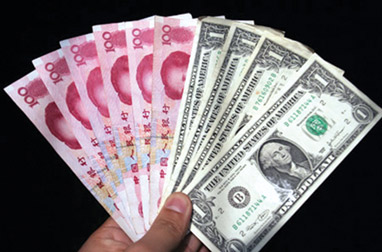China: What do we want?
There is growing momentum to do something about the overvaluation of
the dollar. This is a good thing. The overvaluation of the dollar has
led to record trade deficits. While there is a well-funded industry
devoted to whipping up hysteria around the budget deficit, the trade
deficit actually poses a much more serious cause for concern.
The trade deficit, not the budget deficit, is the reason that other
countries are acquiring large amounts of US debt.
 |
|
Chinese
yuan and the US dollar. Pic. courtesy: Google |
It really should make no difference to us whether foreigners own huge
amounts of government debt or the debt of private companies like General
Electric or Microsoft.
In either case, the foreign ownership of debt means an outflow of
interest income from the United States to other countries.
And, if we are worried that evildoers will cause us great harm by
dumping US Government debt, as opposed to dumping dollar based assets
more generally, then the potential evildoers can sell their GE bonds and
Microsoft bonds any day of the week and buy government bonds.
Then they could threaten to dump US Government bonds. So, any serious
concern about foreign ownership of the government debt should get us to
focus on the trade deficit, not the government deficit.
Trade deficit
There also is the key macro-economic issue that a large trade deficit
implies low national savings. If we have a large trade deficit then we
must have either very low private savings or a large budget deficit, or
some combination.
That is not a pattern for healthy growth. Of course, the reason that
we have a trade deficit is that the dollar is overvalued. The point is
really straightforward. We buy foreign made goods rather than
domestically produced goods because the imports are cheaper.
They are cheaper because an overvalued dollar makes them very cheap
in dollar terms. Similarly, the overvalued dollar makes our exports more
expensive in other countries.
Thankfully, the Obama administration and members of Congress are now
starting to focus on the overvalued dollar. However, the debate is
taking a somewhat perverse form as a beat-up on China crusade. This is
not a very productive route.
The dollar is overvalued against many currencies, although the
Chinese yuan is certainly the most important one, since China has the
largest economy in the world after the United States.
China fixes the value of its currency against the dollar at a price
that is well below the market exchange rate.
Any adjustment of currency values means that the dollar must fall
against the yuan. It would likely also fall against many other
currencies as well, since many countries effectively tie their own
currency to the yuan.
Labour rights
This means that we should want the United States to negotiate with
China to get a higher value of the yuan against the dollar. However, the
effort to push the Obama administration toward this position has
sometimes taken the form of an anti-China crusade.
There have been a long list of complaints laid out against China, all
of which are supposed to tie in with the effort to pressure China to
raise the value of the dollar.
Some of these complaints are clearly legitimate. China is not a
democracy; the government continues to practise censorship, and it does
not respect labour rights. However, some other complaints are more
questionable. For example there are complaints that it does not provide
adequate protection for US intellectual property rights.
Our financial industry has also complained that China's market is not
as open it should be to the likes of Goldman Sachs and Citigroup.
These issues are not about fundamental rights, but rather commercial
dealings. Furthermore, the pursuit of these commercial interests is in
direct opposition to the effort to raise the value of the yuan against
the dollar to increase the competitiveness of US manufacturing.
The logic is straightforward. Any increase in the value of the yuan
against the dollar will be achieved through negotiation.
The US can take unilateral steps, but that is not likely at the
moment. Since we are not in a position to impose everything we want on
China - we have not defeated them in a war - the United States will not
get everything on its shopping list in negotiations.
This means that insofar as we get concessions on paying Disney and
Pfizer more for intellectual property or opening the door to Goldman
Sachs, we will be getting less in the way of a higher valued yuan.
In other words, if Disney and Goldman walk away happy; the rest of us
should be unhappy with the deal.
The effort to raise the value of the yuan and improve the
competitiveness of US manufacturing is not about getting a unified
chorus of China-bashing. It's about a negotiating process in which most
people in the US and the world should hope that Disney and Goldman walk
away as losers.
Courtesy: Truthout,
March 29, 2010
|



